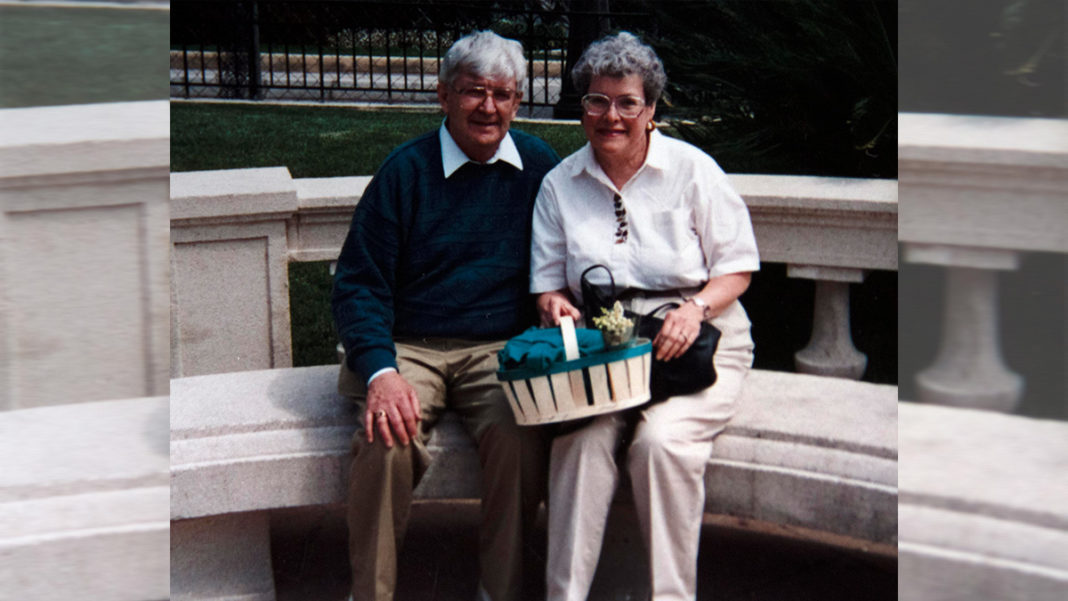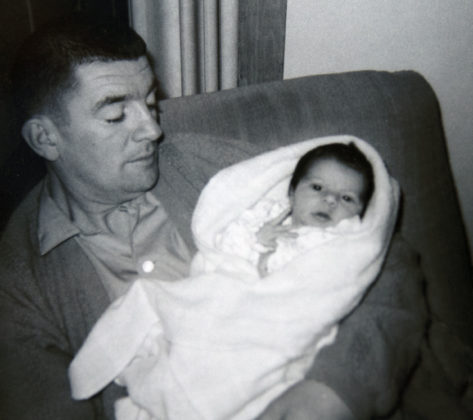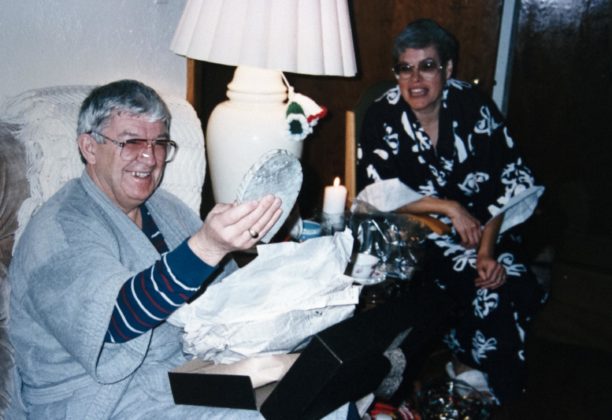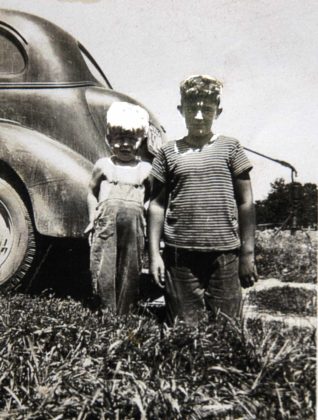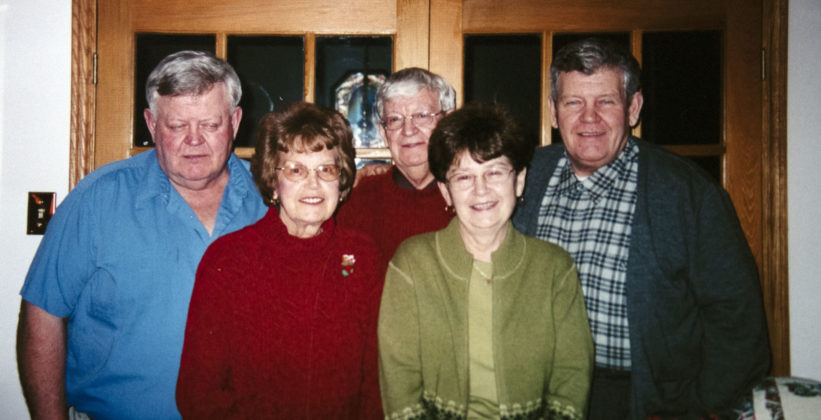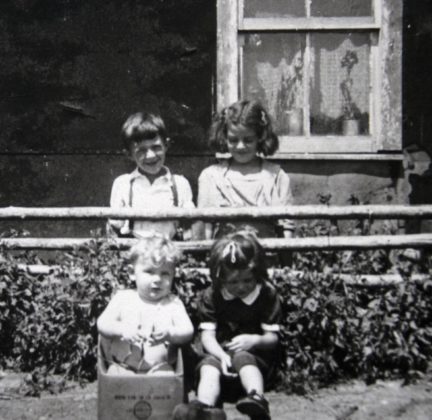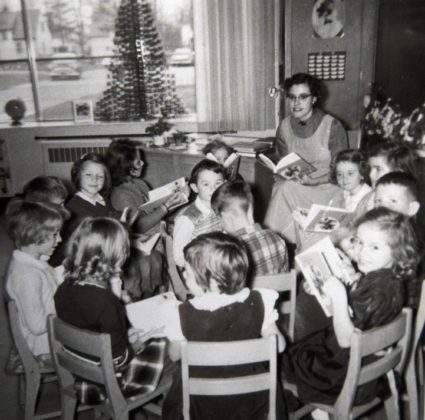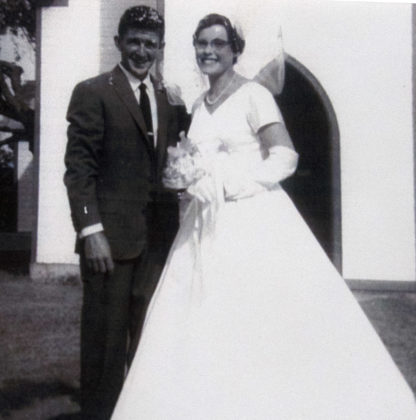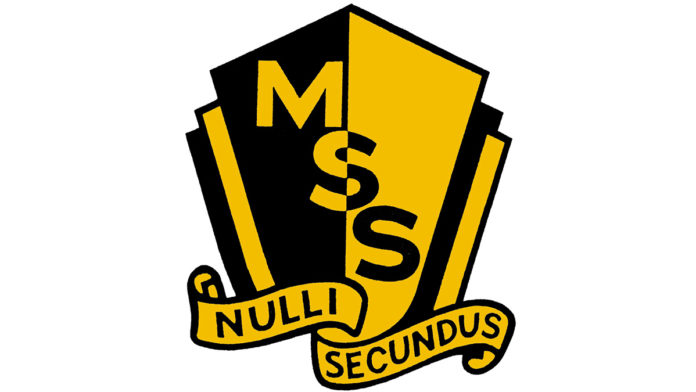Hugh has a kind smile and gentle demeanor. He has lived a life filled with community service, the capacity and insight for which he gained as a young lad. His parents also gave their time and energy to Assiginack. Hugh’s community service included being on council for 46 years, with 24 years as reeve. He was the general manager for the Manitoulin Livestock Co-Operative, as well as trustee and chair of the Assiginack School Board. He was the first chair of the Manitoulin Economic Development Corporation, was on the Manitoulin Planning board, the Police Committee, and the Centennial Manor Board, where he chaired for a few years. He is still treasurer for the Horticultural Society and has a township named after him in the Montreal River area. Moggy Parkway in Sunsite Estates, the first subdivision in Assiginack, also honours the family name. Hugh and Marilyn both enjoyed volunteering at the Information booth on the Chi-Cheemaun.
The Moggy home is a charming stone cottage surrounded by trees and fields. The interior harbors many treasures as well as family and ancestral photos. “Maternal great-grandfather John McArthur’s photo in a big oval frame hangs in the museum. He is buried in the Green Bay Cemetery. He was a councillor here. For his funeral, I was told, there was a procession of 76 horse-drawn carriages bidding him farewell. My maternal grandfather George Chatwell, of English origin, in the photo beside the fireplace, died in 1933, one year before I was born. He had been hospitalized with an ulcer. They had removed the long underwear he always wore, and he died with pneumonia soon after. Grandmother Sarah (McArthur) continued to live with her sisters, Christine, and Isabelle who lived in the same house. Sarah died in 1954.”
Paternal great-grandfather John Moggy moved here from Owen Sound. “They had been told that they could put a plow in the ground, and it would never hit a stone! When they got here after a long, hard journey, with all their belongings, they realized to their dismay, that was not true. They decided to stay, building a home on 200 acres on present-day Highway 6, north of Manitowaning where the Service Ontario is now. Their son, great-grandfather John, born in Manitowaning, died as a young man when his horse-pulled hay wagon toppled and he fell off. My dad Walter, and mother, Elsie (Chatwell) moved in with his parents, Joe and Maryanne after my parents were married. Their Bidwell farm was about five miles from town.”
“Dad Walter was reeve here for five years. He and mother took over the farm when dad’s parents moved into town in the 1935. Grandfather brought with him, four cows, two pigs, and some hens. The animals could walk about the town and eat the grass where they found it. Lawnmowers were not needed. For winter feed, grandfather could cut the hay on the racetrack. They always had a good garden too. Eventually he sold off the livestock but kept one cow which dad bought. Dad walked her the five miles back to the farm.”
Hugh was born on June 20, 1934, in the log house where his mother had taken her first breath. The log house still stands. He would have two brothers, Glen, who later wed Marilyn Pattison and Bill who wed Gwen Hudson. Bill is single now. Hugh’s two sisters are Norma who later married Don Hembruff and Rae who married John Skippen. Bill and Rae both live in the area. Glen and Norma have died.
The Providence Bay Fair was popular but the September Fair in Manitowaning, was the biggest on the Island at the time, hosting many agricultural projects. The horse races were held in the same location every July 1. “When I was old enough, I raised young calves as part of the 4-H club. One special calf was sold for a fair price and was shipped to Toronto. I hated to see him go, I had spent so much time raising him. An important part of the evaluation was the chart I kept of his weight and the type of food he had eaten daily. I added an egg for a shiny coat and halter-trained him for the show. I was proud of my calves, and they often won second or third prize.” From 1962 to 1967 Hugh was the 4-H leader of about a dozen boys in his community.
Early memories include finding a Christmas tree in the bush. “We all would pile into the horse-drawn sleigh and head for the wooded part of our property. The horses, adorned with jingling bells, added a musical ambience as they pulled us along the snowy path. Our tree always reached the ceiling and we helped with the decorations. Christmas morning, each of us would find a basket of oranges and candies. I admit to sneaking out early to find my favourite maple buds, from all five baskets. My siblings were not happy with me, but it was Christmas, and there were always a lot of exciting distractions.”
“As the oldest son, I had a bigger responsibility for farm chores. My schooling ended with grade eight when my dad’s health was deteriorating. He had ulcers, like his dad before him. I was needed on the farm, and I was fine with that decision but finishing school would have been good too. I would have enjoyed the camaraderie, but math was the only subject I enjoyed. My siblings did go to high school. Norma boarded with our grandparents in town, and the other three took the bus. By then the roads were being plowed.”
Hugh had to help with milking cows, shipping cream to Manitowaning, making butter and working with the beef cattle, the sheep and the pigs. “We had chickens in their pens and free-range turkeys as well. At night you could see the turkeys perched in a line on the rail fence. Picking stones from the fields was another chore and may have contributed to my sore back. We built stone fences, or if the fence lines were too far away, we just piled them in the middle of a field.” I recall an early trip to Little Current where we got on the Jacqueline, the ferry across Goat Island, before the CPR agreed to let vehicles share the bridge with their trains. We drove to Espanola and planned to visit the German prisoner of war camp (located during the Second World War in the present-day Domtar mill), but we only saw the fences around it. We couldn’t go in.”
“Both my parents worked hard. I remember seeing my mother make breakfast, usually eggs, oatmeal with real cream and brown sugar and toast for everyone. Then she would head to the field, coiling the hay on a hot day. Soon she would run home to make a big lunch, and later a big dinner, both meals with meat and potatoes. When the kids were old enough to help, she was able to spend more time in the home. She was a good cook. She would compete with her sister for the best baked tarts at the fair.” After Hugh and Marilyn married, Marilyn entered her tarts at the fair. Much to the chagrin of both his mother and Aunt Mina, Marilyn’s tarts won first prize. “Mother was a faithful member of the Horticultural Society, which currently has 28 members. Beautifying the town with flowers was their goal. They did an excellent job.”
Hugh had met Marilyn in 1954 at the dance at the Orange Hall in Manitowaning. She thought him to be a university student. “I was dancing with my cousin, and we were both good dancers. Marilyn seemed to be interested, so I asked her to dance and I was glad I did. I was charmed by her at the onset.” Marilyn’s family had bought Cedar Den Lodge on South Bay in 1945. They had seven cottages. Her dad, Earl Golding, had died while guiding two guests, a doctor, and his wife from America. He and the two guests drowned when the wind whipped up the waves on the bay. Marilyn’s mother continued to run the resort. She and Earl also owned a farm in Thamesford, near London, Ontario. Earl had not liked farming so had bought the resort for their summer activities. Marilyn’s mother sold the farm and began to teach in Thamesford. Each summer she, her two sons and two daughters would return to Manitoulin and run the resort.
Marilyn also became a teacher in the one-room Thamesford country school. She had 52 kids in eight classes. She also taught in Oakville for two years. Hugh would see her in July and August, then over the winter, the two would write letters. In 1958 Marilyn came up to Manitoulin for Easter and Hugh proposed and after a four-year courtship, a wedding date was announced. The couple married on August 30, 1958, at the St. Paul’s Anglican Church in Manitowaning. Marilyn’s uncle Canon Gilmore of Hamilton performed part of the wedding. The celebratory dinner was served at the resort and the dance was held at the Mindemoya Community Centre, where they had attended the Friday night dances. The popular Gore Bay Orchestra provided the music.
The three-day honeymoon took them to Ottawa. “We only had the long weekend because Marilyn had to be back at work on Monday.” Marilyn was now teaching in a one-room schoolhouse in Sheguiandah. There were two teachers. Mrs. Andrews taught Grades 5 to 8 in the front of the room and Marilyn taught Grades 1 to 4 at the back of the class. Marilyn really enjoyed teaching. Meanwhile, Hugh had taken on the management of another dairy farm, belonging to Mr. Gard Gamage, five miles away. “Dad was still managing our farm and we worked together. We had a herd of ‘dual’ purpose shorthorns (both dairy and beef). We shipped cream. I also looked after Mr. Gamage’s summer cottage on Lake Manitou.” Daughter Dianne was born in 1960.
“I managed the farm until it was sold, about 10 years later. They offered me to stay one more year. I stayed for part of that time and then left with Marilyn for a special vacation out west with her aunt and uncle. Mrs. Gamage was not happy with our leaving early so we had to quickly move our belongings. We found a house and moved our possessions in time. We had a great three-week trip with her relatives in their camper in 1966.” During the trip, Granny watched Dianne at the Lodge.
When the travellers returned home, Hugh was out of work. “I found a six-week job in Gore Bay, taking soil samples for Manitoulin Livestock Co-Op. When the six weeks were up, it was year-end and they needed help with inventory. After that, Hugh helped with the cattle sale. Following that, he was needed to drive a petroleum truck for the company. After six more months of driving the truck, a manager was needed for the feed-mill in Manitowaning, on the waterfront, that the Co-Op had acquired. That initial six-week job turned into a 34-year job!
Marilyn was teaching in Wiikwemkoong for a few terms. She was asked to bring in Dianne to help the kids learn English. Dianne would help the kids with English in the mornings and in the afternoons, she would sleep in the car nearby while Marilyn taught the other lessons for the Grade 1 class.
Hugh also served as a school trustee. He was asked to run at the nomination meeting and subsequently became trustee for the Assiginack school board. “Five schools had already been amalgamated into one school. I was with the school board for six years, the last two as chair of the board. My first initiative was encouraging the tendering process for the busing of students.”
In 1969 Hugh decided to run for council. He was nominated from the floor and acclaimed. His council career lasted 46 years with 24 as reeve. “The pandemic forced us to have many meetings by Zoom, which wasn’t as personal as getting together to discuss our issues, but I have no regrets. I was proud to represent my community and I was proud of my councilors. These included, among many others, Wally Harasym, Herb Reid, Happy McLennan, Cliff Mitchell, Lloyd Haner, Dave Ham (who was also reeve), Bud Rohan, Les Fields (who also served as reeve), Elmer McCulligh, Suzanne Smith (the first female councillor in Assiginack), Val Phillips, Lawrence Gammie, Grant Parkinson, Delmer Fields, Paul Moffatt, Brenda Reid, David, Bob and Harold Case.”
“John Tilston was our first clerk when we started. He liked to call me ‘son.’ When he left for health reasons, Sheila Keys became clerk and she stayed for many years. The early meetings lasted two hours and now some Zoom meetings are only 15 minutes long. We took on many projects, like the water and sewage system for the whole town, and artificial ice with an arena addition. We also took on the successful creation of the Manitoulin East Airport, a joint effort with Howland and Little Current. The air ambulance was initiated, and it has been used a lot. We started the first Kindergarten which Marilyn later taught.”
“We started out with a half-ton truck as our fire truck and now we have two good fire trucks and a fire department. A new road grader was added to replace ‘Galloping Gertie.’ The road to Wiky was hard-topped and a new municipal office was built in 1983 on Sprague St. to include the municipal office and a library. The old Indian Affairs office now also hosted the post office. The Bank of Montreal intended to close but we negotiated for it to be open three days a week from 10 am to 1 pm. The hours increased again later.”
“In 1976 the mill was sold to the municipality, and the Manitoulin Livestock Co-Op built the store where NAPA is now. We sold general hardware, feed, fertilizer, and gas for cars.” By 1986 Hugh was the general manager of the Manitoulin Livestock Co-Op and also reeve of Assiginack. “The head office for the Co-Op was in Gore Bay. The three general stores: Gore Bay, Little Current and Manitowaning, were part of the Co-Op. In my 13 years at the Co-Op, I was only trapped once by a snowstorm. I stayed the night at my sister’s house.” In 1988 Hugh was defeated as councillor but was elected again in 1990. Hugh retired from the Co-Op at age 65 in 2000.
Hugh also joined the Manitoulin Economic Development Corporation in the early 1980s and became its first chair. “I worked with Peter Stiles and Don Ridley.” This was the Island’s first venture into community economic development and the present-day LAMBAC is its successor.
“Both daughters did well at school. They didn’t enjoy domestic chores, but I promised to help with that department if they stayed in school. Today, Dianne lives in Toronto but has a cottage here on Lake Manitou. She is married to Dave Shillman, who was a teacher and a pharmaceutical representative. Dianne studied journalism at Carleton University and has been an editor for Harlequin Books for 35 years. She travels to Europe a lot but visits England and New York most frequently. Jane studied Home Economics and Hotel Management at Guelph University. Her partner Dell was employed with Cisco after running a restaurant with Jane. They own property in Manitowaning Bay where Dell loves to fish.”
Any favourite pets? “We have a cat, ‘Springer.’ We found her on the Springer Side Road. At the vet’s office, she sprung off the table to the window, so we named her Springer. She is the most affectionate cat we’ve had. On the farm we had a Scotch collie named Butch who lived to be 16.”
Favourite television shows? “Hockey, ‘Bonanza’ and the ‘Young and the Restless,’ which both Marilyn and I watched. On Sundays it’s a political program called ‘Question Period.’ I still recall my dad listening to the radio during the war years. The announcer Gabriel Heater had a deep solemn voice which made me feel very apprehensive.”
Any recognition to share? “Badges for my winning 4-H calves. The Co-Op sales went from one to 16 million dollars after Hugh and two previous general managers, Max Graham and Bill Chamberlain, had taken the reins.
What are your strengths? “Managing livestock on the farm, keeping good records of food intake, medical interventions and ensuring the fencing is sound. When the sheep gave birth, the lambs often needed help to nurse properly. I helped with that.”
First hourly wage? “Three dollars an hour plus lunch for picking stones.”
What did you enjoy most as a parent? “Seeing the kids grow and get their education. They loved to read and partake in community activities.”
Anyone who inspired you? “Aunt Grace was like my second mother. She took me under her wing, always included me with family events and had Marilyn and I out for Sunday dinners, especially after my mother died.”
Were you named after anyone? “My name is Hugh Reid George after my uncle and my grandfather.” Any regrets? “Not really. I have had a good life so far. Occasionally, I wonder if more education could have changed my life. But my community has always come first, and I have enjoyed this life. After retiring, both Marilyn and I had hoped to take the train out west, followed by a cruise to Alaska. Instead, we went to Ireland twice, and Scotland and England, three times. We took bus tours in Germany, France and Switzerland and several cruises, one across the Atlantic and another to Bermuda. Since Marilyn’s passing, I have had less incentive to travel.”
Any other milestones? “I have had open heart surgery in 2008 and that went well.”
“Manitoulin is always number one in my mind. There is a sense of freedom, privacy and yet you know a lot of the people, even now. We always knew our neighbours well. I miss having good theatre in Manitowaning and a good restaurant to visit before or after the show. The Norisle was only open for six weeks a year. Nevertheless, we have two good hospitals on Manitoulin, a good clinic here, wonderful, friendly people and most of the services we need. We really can’t ask for much more without changing the ambience we have now. Manitoulin is the best.”

